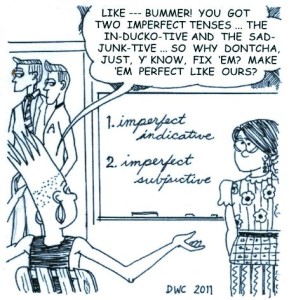The Zen of The “ImpSub”
The “Impsub” is not a subsurface vessel manned by cheeky cherubs, but a tense separating men scholars from boys. I would know, since it long confined me among the latter; I still regress on occasion. The topic must be approached inductively and deductively. If you have been out of college long enough to forget what these are, a refresher (in the context of language study and this tense) follows.
Deduction is (for us) the learning of rules that determine, say, how a verb will look when parsed in the ImpSub or another tense.
Induction is (for us) the memorization of examples in action. In time, you begin to sense (and ultimately to use) a pattern. Induction is about listening, and then capturing through repetition.
We will apply both induction and deduction to this topic.
Verbs are in the subjunctive when unreal states are involved. I do not refer to the euphoria felt by Panajachel expats following an Elvis sighting or an alien abduction. Nor do I refer to the “state” of a dude I once met at Guajimbo’s who asserted that one could live for 50 years as a breatharian.
No, the states in question are those the subjunctive expresses: desire, demand, emotion, uncertainty, doubt. In others words, whatever is not yet, or may never become, operative.
The statement “I wish you readers would also read my other column” (Deseo que ustedes los lectores lean mi otra columna) expresses most of these—desire that you do, emotion if you do not, uncertainty that you will, and doubt that your reading tastes are bad enough to bring the proposition from subjunctive to indicative. The reality, stated, would be: “I know (Sé) that all you readers also read (“reed” not “red”) my other column.” Knowing is reality, but just hoping is not quite.
After I retire from writing columns, all this becomes past tense, and this is where the imperfect subjunctive—the obscurest and zenniest simple tense—kicks in. Then I say that I hoped that my readers read (“red”) my other column: Esperaba que mis lectores leyeran mi otra columna.
Why do I use the ImpSub here? Because the main-clause verb (esperaba) is past tense; therefore the verb in the subjunctive clause is also past tense.
The zenniness of this tense is twofold. It is named like the imperfect, but its conjugations resemble preterite forms. The other zenniness is that it has two sets of endings.
This first zenniness is something we must just live with, although it is counter-intuitive. The case for calling the tense “imperfect subjunctive” rather than “preterite subjunctive” is that, usually, the actions described have an imperfect flavor.
But even when they do not, you still use this tense; it covers both imperfect (progressing or habitual) and perfected (finished or onetime) actions: Esperaba que Pepito leyera mi otra columna cada mes antes de tirar la revista en la chiminea. (I was hoping that Joey “red” my column each month before chucking the magazine into the fireplace).
The good news is that ImpSub conjugation is easy, despite the two sets of endings. You may know that the stem is the third-person plural preterite form for every verb. They are irregular only insofar as the preterite is irregular. You just add -ara or -iera (etc.), or -ese or -iese (etc.). These mean exactly the same. (I will not reprint all the forms here; that is what textbook appendices are for.) For the record, I favor the -ara/-iera forms. The others remind me of the pronoun se, which I could not fully unravel even in a long serial of columns (§35-38).
OK, you have the deductive. Now, after outlining how this gun works, I urge you to do some practice shooting, that you may gain an inductive grasp. Memorize the following.
Si yo fuera tú, no haría eso. (If I were you, I wouldn’t do that). Esperaba que tuvieran un bebé sano (I was hoping y’all had a healthy baby). La jueza dudó que Pepito le contara la verdad (The judge doubted that Joey was telling her the truth). Creyó que veía a Elvis in Tikal (He believed he saw Elvis in Tikal). Insistía en que Pepito compartiera su colonia conmigo (I insisted that Joey share some of his cologne with me).
Reader, learn these, and you will be under way. Then I can say to you someday, ¡Ojalá lo hicieras!
